Putin Wants To Be Adopted By Khamenei, Iranian Cleric Says
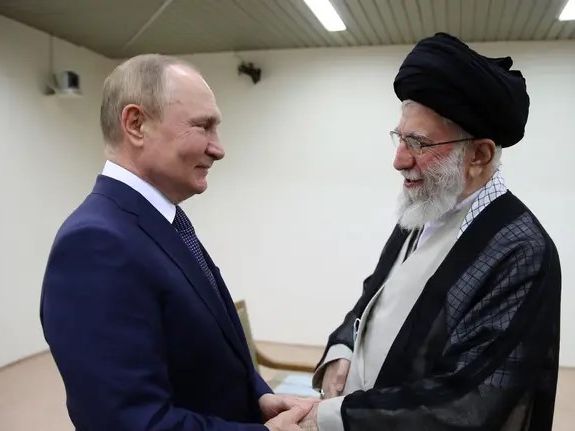
Russian President Vladimir Putin has complete deference towards Iran’s Supreme Leader Ali Khamenei and has expressed his desire to be adopted by him, an Iranian cleric says.

Russian President Vladimir Putin has complete deference towards Iran’s Supreme Leader Ali Khamenei and has expressed his desire to be adopted by him, an Iranian cleric says.
Ayatollah Rahim Tavvakol (71), a member of Iran’s Assembly of Experts, a constitutional body tasked with selecting the next Supreme Leader, said Putin speaks forcefully with the world, but when visits Khamenei “He sits at the edge of the chair and puts his hands on his knees. He speaks politely and with deference with the Imam.” Tavvakol went on to say that Putin, “who is a world politician, tells the Leader that he wants to be accepted as his son.”
In March, elections will take place for the parliament and the Assembly of Experts. Political insiders are scrambling to be allowed to run in these elections and get elected, a process controlled by Khamenei’s hardliner supporters.
The Islamic Republic of Iran is a close ally of Russia, but many see Khamenei’s regime as towing Moscow’s line and dependent on Russia and China amid its international isolation.
Khamenei pursues an anti-West foreign policy and emphasizes relations with non-Western countries opposed to US and European influence.
Ayatollah Tavvakol also reiterated that Khamenei regards the United States as the main enemy and emphasized that there are “nine Zionist lobbies in America.”
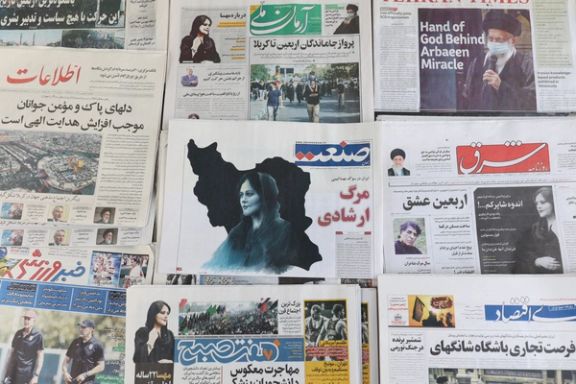
Iranian prosecutors opened a case against the reformist Etemad newspaper on Sunday for publishing an interior ministry document about enforcing hijab rules.
In a report about the deployment of hijab enforcers at Tehran’s subway stations, the newspaper referred to a controversial directive communicated by the interior minister, Ahmad Vahidi, to government bodies and organs, including Tehran Municipality and the Metro Company.
“Months ago, on May 30, the interior minister issued an illegal order [to government bodies] – classified as secret in violation of the law -- which affected thousands. They are dismayed now because Etemad newspaper has published only one page of that illegal directive,” prominent law expert Mohsen Borhani tweeted Sunday.
The document which lists the steps to be taken to enforce hijab rules in “government-controlled places”, proves that the Vahidi’s claim that his ministry had nothing to do with deployment of hijab enforcers at subway stations was a lie.
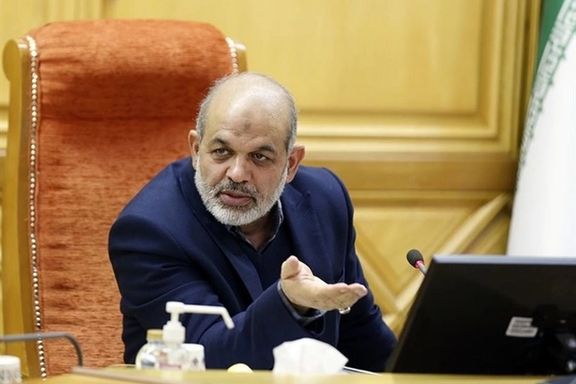
A state official responsible for promoting religious social standards, Mohammad-Hossein Taheri-Akerdi, claimed on Saturday that there are over 2850 “revolutionary and jihadi forces” who carry out the religious duty of enforcing hijab “voluntarily”.
Vahidi’s directive authorizes the police, intelligence organization of the Revolutionary Guards (SAS), and the ministry of intelligence to photograph and film women who do not follow hijab rules in public, including at subway stations and inside metro cars. The evidence will be used for prosecution and intimidation of women to wear the hijab.
Only hours after the publication, Etemad newspaper was indicted by the Office of Prosecutor of Tehran, but the interior ministry has made no comments about the leaked directive.
“Tehran Prosecutor’s Office indicted Etemad newspaper yesterday, not for circulating lies, but for publishing a document that implied the falsehood of the interior minister and Tehran mayor’s statements over the past week,” an article on the frontpage of Tose’e Irani, another opposition newspaper said Monday.
Vahidi and Tehran Mayor Alireza Zakani denied the involvement of their organizations in the deployment of hijab enforcers at Tehran Subway stations and tunnels.
The denials came after a photo went viral on social media that showed women in black-veil uniforms forming a “tunnel” in subway corridors to enforce hijab. These have come to be referred to as “horror tunnels” across the media and social media. Cameramen who take footage of the female passengers accompany the hijab enforcement teams.
Not only officials have denied any involvement in organizing the hijab teams, but they have claimed these are “spontaneous citizens’ groups” enforcing hijab as a religious duty.
Experts say the contents of the directive do not warrant it to be classified and the indictment of Etemad newspaper, therefore, lacks any legal foundations.
Citing articles 4 and 11 of the Information and Free Access to Information Act of 2015, prominent journalist and former politician Abbas Abdi argued in a commentary in Etemad newspaper Monday that decisions that involve public rights or duties cannot be classified.
Article 4 of the said act, Abdi added, stipulates that prosecution of a crime such as publication of a classified document requires the ministry or organization to which the document belonged to initiate a legal complaint, but the interior ministry has not sued Etemad.
“The public prosecutor is a defender of the public’s rights, not the government’s [position],” Milad Alavi, a law student and reporter of the reformist Shargh Daily, tweeted while underlining that it is the interior minister who must be prosecuted for breaking the law of freedom of access to information.
Abdi and others have also challenged the interior ministry and Tehran municipality’s claim that hijab enforcers in uniform and cameramen are “citizens’ groups” because in Iran official permits are required for any public activity including forming citizens’ groups and NGOs.
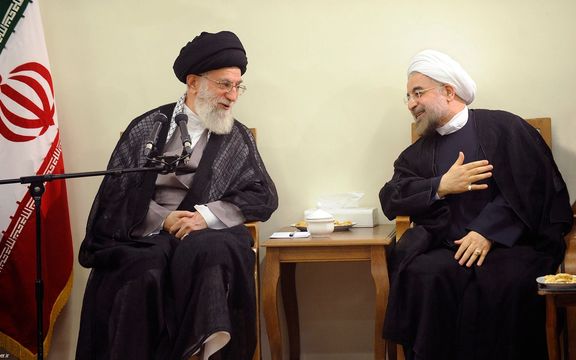
Three months before the controversial elections in Iran, discussions in Tehran are focused on the role of former President Hassan Rouhani and its potential impact.
The upcoming vote on March 1 will determine a new parliament and members of the Assembly of Experts (AoE), responsible for selecting a Supreme Leader after the death of Ali Khamenei. However, the interior ministry, controlled by hardliners, has already disqualified numerous sitting lawmakers from seeking re-election, intensifying the controversy surrounding the restricted elections.
Although the official results of the vetting of the AoE candidates are not yet out, Rouhani's supporters seem to be certain about the endorsement of his qualifications, while his hardliner opponents would like to see him barred. Some others have gone out of their ways to spread fake news about his disqualification or even his death on social media.
Rouhani's recent comments about the elections has convinced many political observers that he is adamant to play a key role in the upcoming elections. The former president known as a pragmatist opposed to hardliners argued that the composition of the next AoE is important because it will have do decide about Supreme Leader’s succession.
Rouhani's comments triggered a series of harsh reactions on the part of hardline media including the Kayhan, which is close to Khamenei's office, and Raja News linked to ultraconservative Paydari Party, i.e., Rouhani's arch opponent.
The website wrote that even if all the moderate and pro-reform candidates in parliamentary and AoE elections are disqualified, still approval of Rouhani’s candidacy will lead to a bipolar situation in the elections. No other figure in the moderate camp can usher likeminded candidates into the parliament or the Assembly of Experts, the website wrote, adding that nonetheless, it is difficult to predict the Guardian Council's decision about Rouhani's qualifications.
To shed light on the importance of Rouhani as a charismatic figure in the moderates' camp, Mahmoud Alizadeh Tabatabaei, a spokesman for the Executives of Construction Party, the leading moderate and pro-reform party has said that the centrist group will support the list of candidates that Rouhani would back. This is a centrist party with Rouhani's closest allies and technocrats such as Mohammad Bagher Nobakht and Es'haq Jahangiri at the helm.
It is the first time that between the two centrist parties, both created by former President Akbar Rafsanjani's aides, Rouhani’s Moderation and Development party will take the lead and the Executives of Construction will follow.
Nevertheless, Alizadeh suggested that the entrenched core of regime insiders is unlikely to permit the emergence of a robust minority faction in the upcoming parliament. He contended that the hardliners have effectively strengthened their control to the extent that even some within their own ranks may struggle to secure seats in the next parliamentary session and assembly.
Meanwhile, pro-reform daily Arman-e Melli warned hardliners in a commentary on Monday that "disqualifying Rouhani will be costly for you, not for him." The daily added: "You cannot send him to the country's political parking area."
Arman-e Melli reported that hardliners are actively seeking Rouhani's disqualification, employing mosques, podiums, and meetings to rally against him, aiming to erase him from the Iranian political landscape. They are determined to convey to Rouhani that his era of political influence is over, urging him to retreat into isolation at home.
Conversely, Rouydad24 highlighted that Hassan Rouhani stands out as the most recognizable candidate for the Assembly of Experts elections, surpassing other candidates in terms of public familiarity. Despite facing criticism, especially for perceived shortcomings in controlling economic challenges, his strong presence on social media remains a significant advantage. The platform noted that this popularity on social media could enhance his chances of securing public support.
Nevertheless, asserting that the people will have the decisive influence in Iranian elections remains challenging.

Siavash Sobhani, a 61-year-old Iranian doctor based in Northern Virginia, recently discovered that his US citizenship, acquired at birth, was mistakenly granted due to a bureaucratic error.
Born in Washington, DC, to a father with diplomatic immunity, Sobhani applied to renew his passport in February, expecting a routine process. However, he received a shocking letter from the State Department, stating that he should not have been granted citizenship at birth and instructing him to apply for lawful permanent residence.
“I’m waiting for an interview but does that mean I wait another year for an interview?” he said. “Then another three years for the next step? Then another 10 years before I can travel outside of the country?”
The letter clarified that individuals born in the US to parents with diplomatic immunity do not automatically acquire citizenship. As his father was on a job at the Iranian Embassy, Sobhani was born at Walter Reed Army Medical Center in 1961. After living in Turkey during his childhood, he returned to the US for education, earning degrees from George Washington University and Boston University before attending Georgetown Medical School.
Concerned about the implications for his medical practice, Social Security benefits, and attendance at his son's wedding, Sobhani diligently followed the directive to apply for permanent residence. However, he faces uncertainty regarding the timeline and fears prolonged bureaucratic delays. Having already incurred over $40,000 in legal fees, he expresses concern about potential hurdles and the inability to visit family and friends abroad.
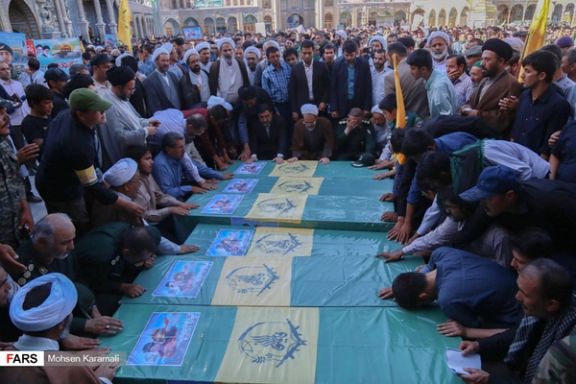
The bodies of eight Iranian fighters who were killed in strikes in Syria have been repatriated and are set to be buried soon.
Tasnim News Agency, affiliated with the Revolutionary Guard, reported that the deceased have been identified through DNA tests. Four of the fighters hailed from Tehran, while the remaining four were from Kermanshah, Golestan, Gilan, and Qazvin provinces. The report did not specify when or in which part of Syria the militants were killed.
However, on November 13, a war monitor reported that at least eight pro-Iran fighters, including one Syrian and Iraqi nationals, were killed in US strikes in eastern Syria.
Washington announced the raids as a response to attacks on American forces the day before. Defense Secretary Lloyd Austin stated, “US military forces conducted precision strikes on facilities in eastern Syria used by Iran’s Islamic Revolutionary Guard Corps (IRGC) and Iran-affiliated groups in response to continued attacks against US personnel in Iraq and Syria.”
Israeli and US armed forces also carried out separate airstrikes targeting Iranian-backed groups in Syria on November 9, killing a total of 12 fighters.
The recent increase in attacks on US troops is linked to the ongoing conflict between Israel and Hamas, which escalated following a cross-border attack by the Iran-backed Palestinian militant group from Gaza on October 7.
There are approximately 2,500 American troops in Iraq and around 900 in Syria, part of the broader effort to prevent a resurgence of the ISIS group.
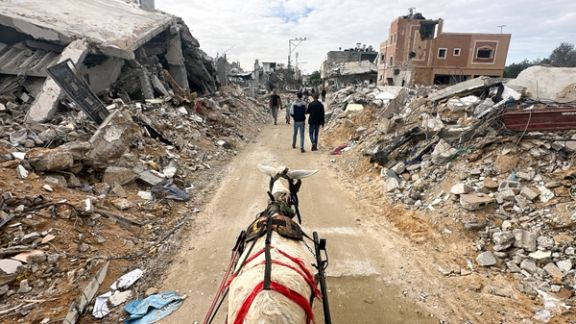
Top Iranian officials have been increasingly making odd statements in recent weeks, trying to convey a sense of invincibility and success, as Hamas struggles to survive.
The commander of the Revolutionary Guard’s navy, Alireza Tangsiri, announced on Tuesday that “We have photos and films about all their movements,” referring to the US naval task force, headed by the aircraft carrier Dwight D. Eisenhower, that has entered the Persian Gulf.
In an age of satellites and surveillance drones, this is a simplistic statement, to say the least, and not clear what it intends to prove. But this is not the only such statement in recent weeks. Iranian commanders have been making claims of military prowess and deploying new weapons systems since the Gaza war broke out and the US deployed two naval strike forces in the region.
The commander of Iran’s aerospace force, Gen. Amir-Ali Hajizadeh declared on November 13 that “Iran is currently at the pinnacle of its power and cannot be threatened.” He went on to say the United States was engaging in diplomacy with Iran using a “language of requests and pleas” amid attacks by Iranian proxy groups on American bases in the region.
While officials try to claim that they were not aware of the October 7 Hamas attack and have nothing to do with strikes by militant groups on US bases, they also try to present these as success to domestic audiences.
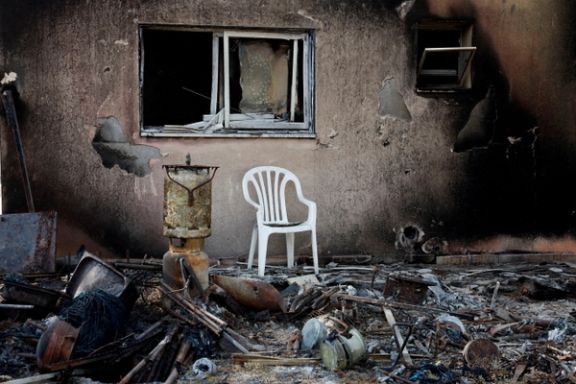
The Islamic Republic has found itself in a precarious situation since the October 7 Hamas terror attack, as Israel responded with overwhelming force in Gaza. After years of propaganda about the readiness of the regime to support war against “the Zionist enemy,” suddenly the rulers in Tehran found themselves in a situation to prove their threats. However, they chose not to get directly involved in the war. Similarly, Hezbollah, Tehran’s crown jewel proxy force, also chose not to engage in a full war with Israel.
Many Iranians on social media began to ridicule officials, saying that they should go to Gaza and fight, while Hamas was being pummeled by the Israelis.
In response, a throng of IRGC officers and officials have made triumphant statements that Israel is all but defeated and is taking its last breath. They have praised Hamas for emulating the spirit of the Islamic Republic in resisting Israel and the United States.
Iran’s minister of defense, Mohammad-Reza Ashtiani on Monday declared that Iran has complete dominance in the region, and that is the reason the United States blames Tehran for every event. “The Americans attribute any event to us because they know that Iran has dominance, and it is the Islamic Republic of Iran that takes the lead in the region."
Mojtaba Abtahi an official in charge of Gaza issues, appearing on state television, insisted that Hamas is in a strong position and added, “With the Hamas attack on Israel, a new world has been created.” He claimed that the people of Gaza are “happy” about current conditions and “Have a lot of hope about the future.”
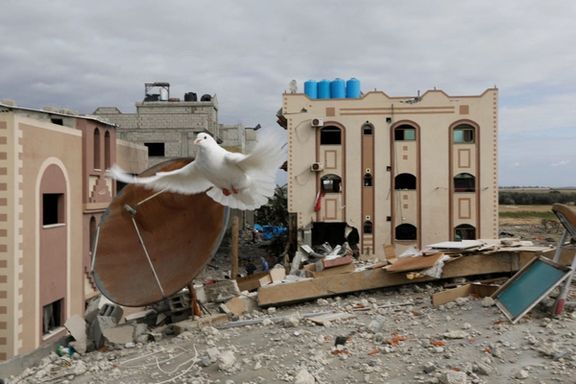
But core loyalists also make strange declarations about other issues. A senior cleric was quoted on Monday as saying that people should get used to living on less, and that will solve the country’s economic crisis. "If we want to address the major economic challenges of the country, we need to instill a culture of contentment and satisfaction in the hearts and minds of individuals,” Ayatollah Mohammad-Reza Naseri declared. He is Supreme Leader Ali Khamenei’s representative in Yazd province. Citizens, whose living standards have drastically declined in the past five years, view such declaration with contempt, knowing that officials do not need to worry about putting food on the table.